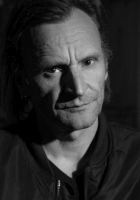 Foto: Philip Scheffner © pong film gmbh
Philip Scheffner
Foto: Philip Scheffner © pong film gmbh
Philip Scheffner (born 1966 in Homburg/Saar) is an artist and filmmaker living in Berlin. Together with Merle Kröger he manages the production company pong, which has produced his own films
The Halfmoon Files (2007),
The Day of the Sparrow (Der Tage des Spatzen, 2010),
And-Ek Ghes (2016 with Colorado Velcu) and
Havarie, but also films by other directors.
Kröger and Scheffner often prepare their projects by doing their research together, for example with the novel
Grenzfall (‘Border Incident’) and the film
Revision.